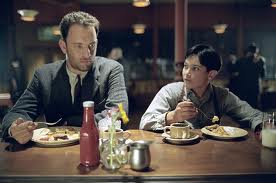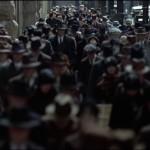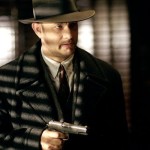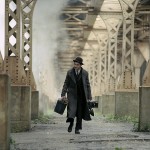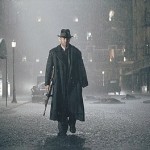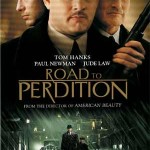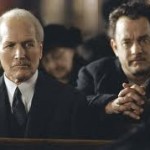Perdition (pəˈdɪʃən) n
1. (Ecclesiastical Terms) Christianitya. final and irrevocable spiritual ruinb. this state as one that the wicked are said to be destined to endure for ever2. (Theology) another word for hell3. utter disaster, ruin, or destruction
Excepting, or maybe even including The Godfather, Goodfellas, the Departed and other masterpieces of the genre, gangster movies have a habit of sending themselves up, in part because the original movies of the prohibition era – George Raft et al – were barely more than lampoons in the first place, often focusing on the allegedly incorruptible figure of Elliot Ness and his squad of Untouchables. Yet we have a wave of them, including Gangster Squad. Time after time, real life gangsters make it to the screen – John Dillinger, Mickey Cohen, Frank Nitti, Parker and Barrow (aka Bonnie and Clyde), and especially the notorious Alphonse Capone.
Hollywood loves a clear battle between good and evil, black and white, yet in their time many of these people were almost folk heroes, the Robin Hoods of their day – not that giving back to the poor was their motive, but they told a tale of the poor, repressed guttersnipe fighting back against the rich and powerful. In real life gangsterland the ambiguity far outweighed its simplistic portrayal in the movies.
The Road to Perdition is no exception in the sense that Frank Nitti makes his obligatory appearance, though thankfully underplayed in the capable hands of Stanley Tucci. There the similarities end. A conventional story of the era, maybe, but well-told in minimal style but glorious imagery by Sam Mendes, immediately after he had completed the amazing American Beauty. The graphic novel origins of the work are plainly apparent, and in that respect share more than a passing nod with Warren Beatty‘s movie of Dick Tracy, though Perdition is much the darker tale – a sort of straight-faced 30s Sopranos in its way.
Tom Hanks is the stoical hitman Mike Sullivan, working these many years for Irish-American crime family boss John Rooney (Paul Newman.) His family are blissfully unaware of his career, and he is quite happy to give the impression he is a respectable businessman. Things start to unravel when one of his sons sees Rooney’s ambitious and psychotic son Conor (Daniel Craig), who is also stealing from him, commit a senseless murder of a made man, Finn.
Thereafter, Sullivan’s wife and younger son are massacred by Conor, and this becomes a straightforward chase-and-be-chased road movie: Sullivan is thirsting in his quiet way for revenge, and to evade capture, robbing banks along the way. Jude Law‘s photographer-turned-assassin Harlen Maguire is in pursuit. The bloody trail leads to the final denouement, with young Michael (Tyler Hoechlin) surviving and vowing never again to touch a gun.
Hanks’s Sullivan, protective of his one remaining son, seems almost baffled by the turn of events, but responds in the only way he knows how when his boss, the one man to whom he has been loyal for many years, tries to have him murdered. This is a mixed bag of a performance: solid without ever being convincing. Frankly, Hanks is not credible as a gangster of any sort, let alone an assassin, however well he goes through the motions. He lacks the killer instinct, simply lacks the wherewithal to be tough and ruthless. By contrast, he is entirely believable as the devoted father. Sometimes you wish he would articulate his feelings more but you can sense that the actor feels much more comfortable in a role requiring him to emote.
Craig too seems strangely miscast, a fish out of water and certainly not the malevolent black sheep he is ultimately painted. While many, mostly women, rate him as the best Bond, he never seems relaxed or comfortable in his skin as the psychopathic Conor, where Law for example is obviously having a whale of a time. Newman, however, is magnificent and worth the price of admission on his own. Utterly credible, his accent authentic, his fear of his own son totally believable. What a classy actor he was, late and sadly missed.
With some actors adapting far better than others, the impact is very bitty, with some scenes coming over as very strained and stylised, where Mendes wanted them to be played in a much more naturalistic way, sometimes humorous and often with the threatening edge delivered so brilliantly by The Godfather and Goodfellas.
However, there are two magical scenes worth repeating: where Newman’s Rooney makes Conor repeat his apology for killing Finn; and where Sullivan takes a note to the sleazy nightclub owner who has failed to pay his dues to Rooney – Sullivan realises just in the nick of time from the body language that his life is in danger so he kills the guy and his bodyguard.
So in summary, this is a fair attempt at an engaging movie about gangsterdom and ultimately about the bonds of family, though like the proverbial curate’s egg it is good in parts but not quite so good in others. Certainly not “utter disaster, ruin, or destruction“, but nothing like as good as it could have been with more effective casting. Definitely worth a watch but not the definitive movie of its genre, not quite as ambitious as it hopes to be. And that really is the point – it comes over as a movie, not a story told within the movie.

